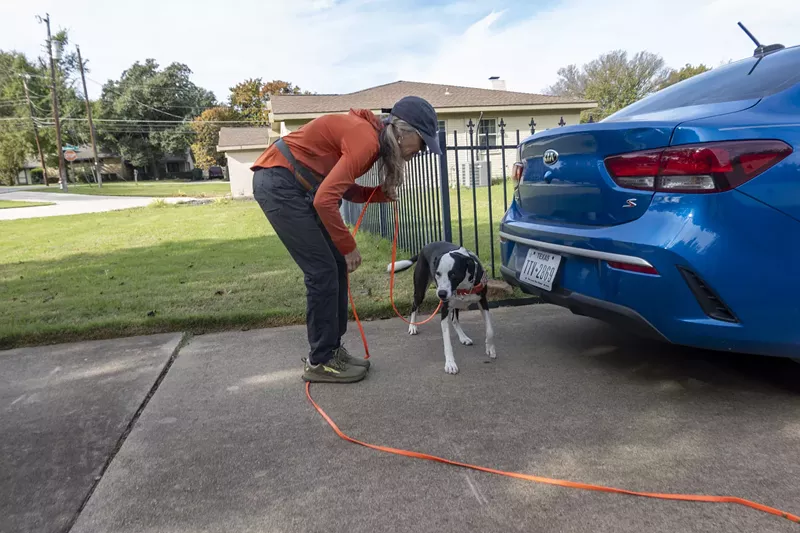The lost pet specialist initially refused to take the case. She believed that the cat, missing for six days in what she calls Fort Worth's “Coyote Land,” had likely been killed. But Hale was moved by the client’s desperation and insistence that "Wick" was family and agreed to help.
She got her canines to work as she arrived on the scene. Two of them immediately indicated that something had gone wrong in the same spot, Hale says. She decided she'd continue searching around the area, eventually returning to the owner's property. The owner had insisted they'd done a good sweep of the place, but Hale wanted to do her own search.
She eventually stumbled upon a severely injured cat hiding away inside the owner's shed. It was Wick. He had been hit by a vehicle and Hale says he did the standard cat thing of “running for cover” instead of help. After “thousands of dollars of surgery,” Wick is still alive three years later and the owner sends a thank you message to Hale each year.
To McCririe-Hale, successful cases like these solidify her decision to become a pet detective. The 63-year-old wants to continue searching for lost pets and reuniting them with owners before she retires.
“It makes life seem worth it,” Hale says. “It's a hard job. It can be really cold, be really hot and be really dangerous. My clients are not always in their right mind, and I wouldn't be either. They can be really hard to deal with, but the chance that that's going to happen is always there. I fail more than I succeed, but the chance is always there and that keeps me going.”
The Scent Behind the Detective
Hale’s entry into the business came in 2006 when she helped find a missing dog in St. Louis. A person on vacation had their car stolen with their dog still inside. Hale contacted the victim and offered to drive them around to local shelters along with a group of volunteers who aided in the search. The canine was never found, but Hale was forever inspired by the incident.”We learned some things that were helpful for searching for pets and things that were not,” Hale says. “We also learned about the idea of using search dogs the same way that we search for missing humans and thought that could be applied to pets as well.”
She then took lessons with her dog Murphy under Kat Albrecht, a pet detective and director of Missing Animal Response. Under Albrecht’s wing, Hale learned how to train her canine to search for pets using search-dog tactics similar to those used on humans. Then she took the steps to become a missing animal response technician and a licensed Texas private investigator. In 2007, Hale launched her website. That’s when she felt she became a professional pet detective.
“Didn't take long, the phone started ringing,” she says. “So, yeah, thank God for the internet because there’s no way you can have as weird a business as I have and make a living on it if we didn’t have the internet to advertise it basically for free.”
For 15 years, Hale searched for all types of missing pets for clients but stopped taking cases involving dogs because she had a higher success rate with cats. According to Hale, cats typically do not venture far from their homes, but dogs have a habit of exploring farther away.
Typically, when Hale takes a case for a missing dog, the animal is found deceased or trapped near the property. She says that most canine cases are contracted at least 24 hours after the dog has been missing, which makes it more difficult to locate them given their nature of wandering far from home.
“I don't think the expense justifies the number that we actually would track up on,” Hale says. “That's what people are expecting is for you to follow the scent trail of their pet and find them. That's what they're expecting. That's what they want, because that's what they see in the movies.”
Since time is the largest variant in the search for a pet, Hale has opted to not take cases older than two weeks. Instead, she might offer to show pet owners how to understand or work with lost animal sightings.
“Sometimes people need the truth,” Hale says. “I have that conversation a dozen times a week with people who have either waited too long or the situation is too difficult that my service is very unlikely to help.”
The Lost Pet Business
The American Veterinary Medical Association estimates that about 10 million pets go missing a year in the U.S. Pawboost, a website for reporting missing pets, currently reports there are 1,034 pets missing in Texas. Information on how many pet detectives are in Texas is unavailable.A typical case for Hale begins with a free 15-minute phone consultation in which she discusses with a potential client the probability of success for their case. She also asks how long the pet has been missing to determine whether she’ll take the case.
“I tell them, I fail more often than I succeed,” McCririe-Hale says.
Once contracted, Hale arrives on the scene at a scheduled date in her maroon van with a canine or two secured in the back. McCririe-Hale’s next step is scoping the surrounding area for things such as predators roaming the area. Finally, she has a canine track the scent of the missing pet.
She’ll follow the canine around, looking everywhere a cat could have ventured or hidden. She asks to go into neighbors’ backyards if the scent leads her there.
“Where’s kitty?” she will say, a phrase she claims she’s said too many times to count. Eventually, if the dogs find the cat, alive or deceased, they will alert her audibly.
To follow in Hale’s footsteps, an aspiring pet detective would need a dog trained to track scents. Hale's clients praise her for this.
“Bonnie came out with her dogs and, I kid you not that [her search dog] IdaBelle found her in under an hour,” Mindy Daily Owens said in a testimonial for the business.
Nearing retirement, Hale wants to work at least one more year. She has considered taking on an apprentice to continue her work. But with the business being as niche as it is, Hale cannot afford another employee at the moment.
“There'll be weeks where if there were three of me, we can all be finding cats every day," she says. "That's really hard for me, when I can't get to everybody."
Though she doesn't always succeed, Hale says it's immensely rewarding every time a pet is reunited with its owner. This prospect is always what keeps her going.
“I don't have human kids of my own, so my dogs are my family and I know that a lot of my clients feel exactly the same way,” Hale says. “If somebody is missing out on that, it's exquisitely painful, and I've found a way to help some of those people stop that pain and get that animal back where it belongs.”












